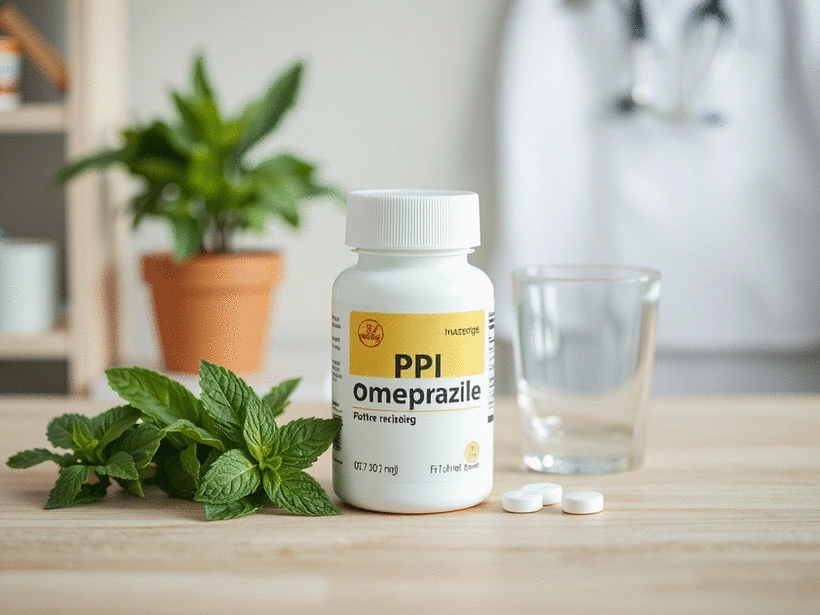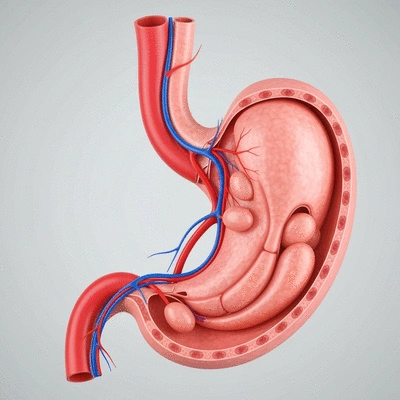Understanding Proton Pump Inhibitors

Did you know that proton pump inhibitors (PPIs) significantly reduce gastric acid production, which can provide relief for millions suffering from acid reflux? Understanding their mechanism and implications is crucial for effective treatment.
What You Will Learn
- Mechanism of Action: PPIs inhibit the H+/K+ ATPase enzyme, effectively reducing stomach acid production.
- Long-lasting Relief: These medications bind irreversibly to the proton pump, providing sustained effects.
- Personalized Treatment: Discuss your individual health needs with your healthcare provider for tailored advice on PPI use.
- Potential Risks: Long-term use of PPIs may lead to risks like kidney disease and increased infection rates.
- Benefits Beyond Symptom Relief: PPIs promote mucosal healing and enhance overall digestive comfort.
How PPIs Reduce Gastric Acid Secretion
Proton Pump Inhibitors (PPIs) are highly effective in managing acid-related disorders by targeting specific mechanisms in the body. The diagram below illustrates their action and key benefits.
Mechanism: H+/K+ ATPase Inhibition
PPIs bind irreversibly to the proton pump (H+/K+ ATPase enzyme) in parietal cells.
Effect: Significantly Decreased Acid Secretion
Inhibiting the proton pump leads to a substantial reduction in the volume of stomach acid.
Benefits: Symptom Alleviation & Healing
Reduces heartburn and regurgitation, promoting healing of the esophageal and stomach lining.
Usage: Before Meals for Effectiveness
Typically taken before meals to achieve optimal effectiveness in managing gastric acid production.
Understanding Proton Pump Inhibitors: Mechanism of Action
Proton pump inhibitors (PPIs) play a crucial role in managing acid reflux and other acid-related disorders. By targeting specific mechanisms in our body, these medications help to reduce the production of stomach acid. This is especially beneficial for those experiencing discomfort from conditions like GERD, where excessive acid can lead to painful symptoms. Let’s dive into how these medications work!
How Do PPIs Work to Reduce Gastric Acid Secretion?
PPIs act primarily by inhibiting the H+/K+ ATPase enzyme, commonly referred to as the proton pump. This enzyme is responsible for the final step in gastric acid production. When PPIs block this enzyme, the secretion of stomach acid is significantly decreased, leading to a reduction in acidity in the stomach and esophagus.
- PPIs bind irreversibly to the proton pump, providing long-lasting effects.
- They reduce the overall acidity, preventing irritation of the esophagus and stomach lining.
- These medications are typically taken before meals for optimal effectiveness.
This mechanism is particularly important for managing conditions such as GERD, as it helps to alleviate symptoms by reducing the volume of acid that can reflux into the esophagus. For a comprehensive overview of PPI usage and efficacy, you can refer to insights from PubMed Central on proton pump inhibitors. In my practice, I often emphasize the importance of understanding how these medications work to empower patients in their treatment journey.
The Role of H+/K+ ATPase in Acid Regulation
The H+/K+ ATPase enzyme is essentially the powerhouse behind acid production in our stomachs. Located in the parietal cells, this enzyme actively pumps hydrogen ions (H+) into the stomach while exchanging them for potassium ions (K+). This process creates the acidic environment necessary for digestion.

When PPIs inhibit this pump, they effectively disrupt the acid secretion process. As a result, the stomach's pH level increases, leading to a less acidic environment. This shift not only helps in managing acid reflux symptoms but also promotes healing of the esophageal lining.
Pharmacological Effects of Proton Pump Inhibitors
Beyond just reducing acid production, PPIs have several pharmacological effects that contribute to their therapeutic benefits. One important effect is the ability to promote mucosal healing in the esophagus and stomach, which is vital for patients suffering from erosive gastritis or Barrett's esophagus.
- PPIs help reduce the risk of esophageal damage from frequent acid exposure.
- They can improve overall digestive comfort by alleviating symptoms like heartburn and regurgitation.
- These medications may also lower the risk of complications from long-standing acid-related conditions.
In my experience, patients often find that understanding these pharmacological effects not only enhances their compliance with medication but also provides a deeper appreciation for their treatment plan.
Medical Applications of Proton Pump Inhibitors
As a gastroenterologist, I have witnessed firsthand the impact that PPIs can have on digestive health. Their applications extend beyond just treating acid reflux; they are vital in managing various acid-related disorders. Let's explore how these medications fit into the broader picture of digestive health management.
We Want to Hear From You!
As you consider your treatment options for acid-related disorders, what aspects of proton pump inhibitors (PPIs) are most important to you? Share your thoughts below:
Summarizing the Role of PPIs in Managing Gastric Health
In the world of digestive health, proton pump inhibitors (PPIs) have become a cornerstone for managing various acid-related disorders. Understanding their role is crucial for anyone dealing with conditions such as GERD or peptic ulcers. Here, I want to highlight the key takeaways regarding their uses and potential risks so you can make informed decisions about your health.
Key Takeaways on the Uses and Risks of PPIs
When considering PPIs, it’s essential to weigh the benefits against the possible risks. Let’s break it down:
- Effective for symptom relief: PPIs are highly effective in reducing gastric acid production, leading to relief from heartburn and regurgitation.
- Not without risks: While they offer significant benefits, long-term use has been associated with potential health risks, including kidney disease and certain types of infections. For more details on the potential long-term effects, Harvard Health offers an insightful article on proton pump inhibitors.
- Personalized treatment: Every individual’s health needs are unique, making it vital to discuss your particular situation with your healthcare provider.
These points should guide your conversations and decisions around PPI use, ensuring you’re aware of both the advantages and the concerns.
Evaluating the Benefits Versus the Risks
It’s not simply about choosing to use PPIs; it’s about making an informed choice. Each patient’s circumstances can lead to different outcomes. As I often remind my patients at What is Acid Reflux, while PPIs can be a game changer for symptom management, understanding their long-term implications is equally vital.

For instance, those with underlying kidney issues may need to approach PPI therapy cautiously. Additionally, if you’re looking to use PPIs for a prolonged period, discussing monitoring strategies with your healthcare provider can be a smart move!
Personalized Considerations Based on Health Needs
Everyone’s journey with acid reflux is different, and so are the treatment paths. At What is Acid Reflux, I encourage you to think about your overall health and lifestyle when discussing PPIs with your doctor. Here are a few personalized considerations to keep in mind:
- Your history of digestive issues and previous treatments.
- Any current medications that might interact negatively with PPIs.
- Your lifestyle factors, such as diet and stress levels, that can influence your symptoms.
By considering these factors, you can work with your healthcare provider to find a treatment plan that fits your unique needs.
Frequently Asked Questions About Proton Pump Inhibitors (PPIs)
- Q: What are Proton Pump Inhibitors (PPIs)?
- A: PPIs are a class of medications that significantly reduce gastric acid production by inhibiting the H+/K+ ATPase enzyme in the stomach's parietal cells. This helps alleviate symptoms of acid reflux and related disorders.
- Q: How do PPIs work?
- A: PPIs work by irreversibly binding to the proton pump (H+/K+ ATPase enzyme), which is responsible for the final step in stomach acid secretion. By blocking this enzyme, they effectively decrease the amount of acid produced, raising the stomach's pH level.
- Q: What are PPIs used to treat?
- A: PPIs are primarily used to treat acid-related conditions such as gastroesophageal reflux disease (GERD), peptic ulcers, Zollinger-Ellison syndrome, and erosive esophagitis. They help relieve symptoms like heartburn and regurgitation and promote healing of the digestive lining.
- Q: What are the potential risks of long-term PPI use?
- A: While generally safe for short-term use, long-term use of PPIs has been associated with potential risks including kidney disease, increased risk of certain infections (like *Clostridium difficile*), bone fractures, and nutrient deficiencies. It's important to discuss these risks with your healthcare provider.
- Q: When is the best time to take PPIs?
- A: PPIs are typically most effective when taken about 30-60 minutes before a meal, usually in the morning. This allows the medication to be absorbed and reach the parietal cells when they are most active, optimizing their acid-blocking effect.
Encouraging Informed Decisions About Proton Pump Inhibitors
At the end of the day, the choice to use PPIs should be made with thoughtful consideration and professional guidance. Educating yourself is a crucial step in managing your digestive health effectively!
Consulting Healthcare Professionals for Tailored Advice
One of the most important steps in navigating PPI use is consulting your healthcare professional. They can provide tailored advice based on your specific circumstances, helping you make decisions that are in your best interest. For reliable medical information on PPIs, including their uses, benefits, and risks, the Cleveland Clinic offers a detailed guide.
Making Choices Based on Individual Health Context
When considering PPIs, think about your health context. Ask yourself:
- What symptoms am I experiencing?
- Have my symptoms been diagnosed as related to acid reflux or another condition?
- Am I currently on any medications that might interact negatively with PPIs?
These questions will help clarify your needs and guide your discussions with your healthcare provider.
Understanding Your Treatment Options for Optimal Care
In addition to PPIs, there are other treatment options available for managing gastric health. It’s essential to explore these alongside your doctor:
- Antacids for immediate symptom relief.
- H2 receptor antagonists for alternative acid suppression.
- Lifestyle changes, such as dietary adjustments, to support overall digestive health.
By understanding the full spectrum of your options, you empower yourself to make choices that align with your health goals.
Patient Education on PPI Use and Side Effects
Lastly, being informed about the potential side effects of PPIs can prevent unpleasant surprises down the line. Key side effects to be aware of include:
- Nausea and diarrhea
- Headaches
- Increased risk of certain infections
Your experience with PPIs should be as comfortable and beneficial as possible. By staying educated and engaged in your treatment, you're taking proactive steps toward better digestive health. What questions do you have about your treatment plan?
Recap of Key Points
Here is a quick recap of the important points discussed in the article:
- PPIs effectively reduce stomach acid production by inhibiting the H+/K+ ATPase enzyme.
- They provide long-lasting relief for conditions like GERD by decreasing acidity in the stomach and esophagus.
- Patients should consider personalized treatment plans and discuss potential risks of long-term PPI use with their healthcare providers.
- Understanding the pharmacological effects of PPIs can enhance treatment compliance and patient education.
- Consulting healthcare professionals is essential for making informed decisions about PPI therapy and exploring other treatment options.









